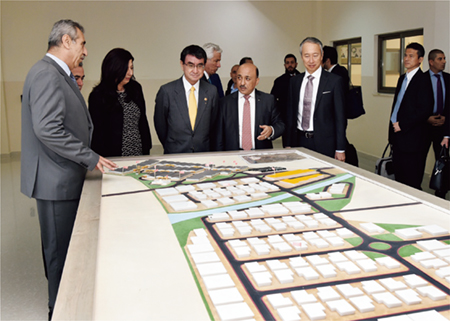Stories from the Field 05
Promoting Economic Independence by Supporting Development of the Industrial Estate
– Japanese Assistance Acting as an Intermediary between Israel and Palestine
In 2006, Japan announced the “Corridor for Peace and Prosperity” initiative for Israel and Palestine relations, and since then Japan has contributed to peace-building by promoting the independence of Palestine's economy and society aimed at the realization of this concept. The Jericho Agro-Industrial Park (JAIP) is a core project of this concept. The city of Jericho located in Eastern Palestine is the lowest elevation community in the entire world as it sits at an elevation of 250 meters below sea level. The city has a warm climate even in the winter and features huge oases and a number of natural springs. This makes Jericho ideal for growing olives, bananas, dates and other crops. JAIP aims to process the myriad crops grown in and around Jericho into value-added products and export them to Persian Gulf countries via Jordan.
In recent years, however, water shortage has become a major issue caused by the growing population, the rise of new industries, and water leaks due to deteriorating infrastructure. Additionally, Palestine is subject to restricted movement of people and goods, including the supply of electricity and use of land. Easing these restrictions is vital to the development of industrial estates. For the development of Palestine's economy, the number of companies operating at JAIP needs to be increased in the future. The natural resources existing in the west bank of the Jordan River including Jericho are under the control of Israel. Therefore, the development of the infrastructure necessary for JAIP, including drilling of a dedicated well, would not have been possible without obtaining consent from Israel.
Following the opening of JAIP, Japan has endeavored to build the capacity of the Palestinian Industrial Estates and Free Zones Authority (PIEFZA*), which developed and operates JAIP, through technical cooperation for the construction of leased factories, infrastructure development and improvement of skills for operating industrial estates. Mr. Takeo Matsuzawa headed up the project for institutional strengthening of PIEFZA for JAIP from 2010 to 2013 and the Project for Strengthening Incentive Service and Management Function for JAIP from 2014, after engaging in supplemental surveys for the feasibility study (F/S) beginning in August 2009. He talks about future prospects as follows.
“We had started developing JAIP to attract companies in Palestine into the industrial estate and to promote exports by expanding companies' operations so that they could have international competitiveness. With restrictions imposed exports from Israel to Persian Gulf countries, we think Israel would not have any objections about developing industries in Palestine that do not compete with Israel's. By enabling exports of products made in Palestine to the Middle East, particularly the Persian Gulf, we aim for the independent economic development of Palestine in the future.”

Japan's Minister of Foreign Affairs Taro Kono paid a visit to JAIP, a flagship project under the Japanese-led Concept for “Creating the Corridor for Peace and Prosperity,” during his trip to Palestine in December 2017.
To secure export routes which are key to JAIP's success, plans are under consideration to construct a main distribution road to connect JAIP with the Jordanian border. Japan is now proceeding with detailed surveys and planning while seeking the consensus of Israel and Palestine through regular talks. With JAIP's development progressing, specific contents of the shipment volume of products and the traffic volume related to transport became clear, and as a result, Israel is now moving ahead with the construction of the road. For Palestine, this connection with the Middle East and Persian Gulf is a major step forward. “I hope Japan can serve as a bridge for this connection,” explains Mr. Matsuzawa with enthusiasm.
This project has achieved a number of results over the past roughly seven years. One example is that lease agreements have been signed with around 40 tenants as of October 2017, and of these, eight factories have already started up operations at JAIP, including ones for olive supplements, soaps, frozen potatoes, cushioning materials for packaging, and dates packaging, among others. This can be seen as the positive outcome of JICA experts' continuous support to improve PIEFZA staff's operational and development capacities of JAIP as well as that of the industrial estate's developer through PIEFZA. Additionally, the development of JAIP has promoted dialogue and negotiations mediated by Japan between Palestine and Israel in a wide range of critical areas, including water, electricity and road construction. This marks the first time that Israel and Palestine have engaged in talks on the industrial development of Palestine, and speaks volumes about the trust that Japan has earned from both of them. This also speaks of the positive outcomes of the persistent support provided by Mr. Matsuzawa and others for capacity building, while working to solve daily challenges together with local stakeholders.
Japan's long-term view on development cooperation sparing no efforts to encourage the independence of local people has entered the phase where the Palestinian people would enjoy the fruit of economic development.
* PIEFZA: A government institution established in 1998 to support industrial estates developed by Palestine's private sector within the Palestinian National Authority.
<< Previous Page Next Page >>
Main Text | Statistics and Reference Materials | Stories from the Field | Master Techniques from Japan to the World | ODA Topics
